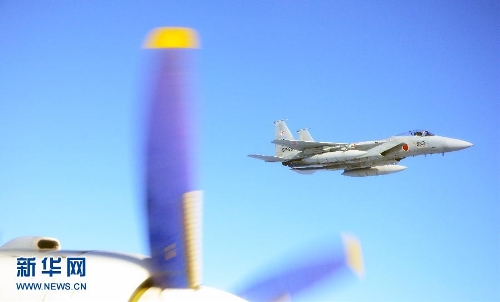
File photo of a Japanese F-15 fighter jet. Photo: Xinhua
Russia has protested against joint military exercises among Japan and NATO countries, including Germany and Spain, taking place on the northern Japanese island of Hokkaido, which neighbors Russia's Far East.
Moscow claims the drills pose a "potential threat" to Russian security. But Chinese experts said on Sunday that the drills, being manipulated by the US behind the scenes, target not only Russia but also China, endangering the peace and stability in Northeast Asia.
According to the Japan Times on Tuesday, a contingent of more than 30 military aircraft from Germany, France and Spain will arrive in Japan in July to conduct a series of training exercises with Japan's Air Self-Defense Force (ASDF), marking the first trilateral air force deployment to the Asia-Pacific by the three European countries.
The report, citing the Japanese Defense Ministry, noted that the ASDF's drills with France will take place on July 19 and 20 in the airspace around Hyakuri Air Base in Ibaraki Prefecture, while those with both Germany and Spain will be held in the airspace around Chitose Air Base in Hokkaido.
Russia protested to Japan on Friday about Tokyo's plans and accused Prime Minister Fumio Kishida of placing his country "on a path to dangerous escalation," Reuters reported on Saturday.
"We view such activity as a potential threat to the security of the Russian Federation," Russia's Foreign Ministry said in a note on its website.
The joint military exercises are clearly orchestrated by the US as they are mobilizing more NATO member forces to the Western Pacific and Asia-Pacific regions to demonstrate their combined air combat capabilities, Wei Dongxu, a Beijing-based military expert, told the Global Times on Sunday.
The exercises clearly provoke Russia, as one of the long-distance flight routes is from Alaska, US to the northern region of Japan, potentially approaching Russian airspace, and may involve simulated attack drills, Wei said.
In recent years, some NATO members, including the UK, France and Germany, have frequently sent naval and air forces to the Asia-Pacific region, conducted operations with the ASDF around Japan, and constantly expanded the mechanisms and forms of military cooperation, with the intention of creating conditions for further involvement in the Asia-Pacific security affairs.
"Northeast Asia is already a hot spot at a dangerous stage. In such a period, the US continues to carry out military exercises in the Asia-Pacific, targeting China. This time the long-distance rush of some NATO countries to the region for military exercises should put us on high alert," Lü Chao, an expert on the Korean Peninsula issue at the Liaoning Academy of Social Sciences, told the Global Times on Sunday.
He analyzed that NATO members want to stir up trouble in the Asia-Pacific to alleviate the pressure from conflicts in Ukraine and those in the Middle East. Therefore, the US-led NATO has turned to Japan, which has a delusion of restoring its hegemonic position in East Asia, for cooperation, creating a new military deterrence situation in the region.
Media outlets reported that Kishida is set to attend the NATO summit in Washington on July 9, making it the third consecutive year that a Japanese prime minister will have attended the summit. In response, Lü warned that as Japan continues to expand and develop its military capabilities beyond its self-defense needs, if the remnants of militarism are not properly addressed, Japan could once again become a center of disaster in the region.
With the US consolidating resources from its global allies to concentrate more offensive combat forces in the Asia Pacific, NATO's Asia-Pacific expansion poses a threat to regional peace and stability, Wei stated.




